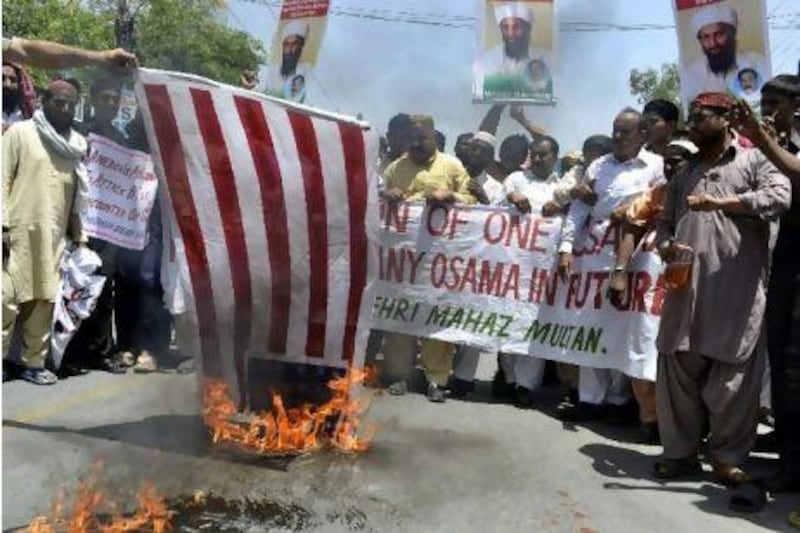KABUL // The Taliban leadership took 36 hours to issue an official statement on the death of Osama bin Laden in which it questioned whether the al Qa'eda leader was dead but failed to condemn the Americans for their actions.
The statement even refrained from offering praise for a man they once admired and protected.
Osama bin Laden: Complete coverage of the killing of the world's most wanted terrorist.
Last Updated: May 4, 2010
Bin Laden's long-time deputy set to become al Qa'eda leader Ayman al Zawahiri, Osama bin Laden's long-serving deputy and al Qa'eda's chief ideologue, is set to become the terror network's new leader. Read article
Arabs question America's account of bin Laden's death From 'great news' to 'he isn't even dead', the word on Arab streets goes both ways, as people ask questions over a missing body.Read article
Did Pakistan know bin Laden was hiding out near Islamabad? In the wake of the raid that ended a decade-long manhunt for Osama bin Laden, Islamabad is having to fend off suggestions that it may have known bin Laden's whereabouts all along. Read article
Leaders praise US for bin Laden raid; India criticised Pakistan Leaders around the world praise the US for raiding Osama bin Laden's mansion in Pakistan and killing him. Read article
Osama bin Laden (1957-2011) To his enemies he was the epitome of evil, but to his supporters he was a hero. Read article
Afghans worry that US will withdraw now that Osama is dead "We came here for bin Laden but we're staying for the Afghans," a US military analyst says after US special forces kill the al Qa'eda leader. Read article
US celebrates Osama bin Laden death at White House Thousands converge on the White House to celebrate the death of Osama bin Laden. Read article
Now to undo the damage bin Laden did Bin Laden declared war on the United States, but the battlefield has been the Middle East and South Asia. Read article
This tepid and delayed response is sparking intense debate in Afghanistan: is the Taliban, once the loyal host of bin Laden and his fighters, ready to give up the fight?
Taliban spokesman Zabihullah Mujahid said in an e-mailed statement: "As the Americans did not provide any acceptable evidence to back up their claim, and as the other aides close to Osama bin Laden have not confirmed or denied the death, the Islamic Emirate considers any assertion premature."
For years, the Taliban have waged a fierce insurgency against foreign troops here, after bin Laden planned the September 11, 2001 attacks from what was then Taliban-ruled Afghanistan, prompting US forces to invade the country later that year.
But the largely Afghan movement has made efforts to distance itself from al Qa'eda for years, says a New York University report published by Kandahar-based researchers Alex Strick van Linschoten and Felix Kuehn in February.
The Taliban had also stepped up their media relations in recent years, sending breaking news SMS updates to journalists, issuing timely statements and maintaining a comprehensive website outlining its operations in five languages.
But on Tuesday, Taliban spokesman Zabiullah Mujahid told The National: "In the last 10 years, because of the war, we could not stay in touch [with al Qa'eda]. Most of the time, our leaders didn't even know where Osama was."
Its initial silence and subsequent lukewarm response to bin Laden's death could mark the beginning of a definitive split from the global jihadist network, and pave the way for a negotiated political settlement to end the 10-year Afghan war, analysts say.
Mr Strick van Linschoten said: "What [bin Laden's death] does is removes one possible difficulty for the Taliban in making this step [toward cutting ties with al Qa'eda].
"Without bin Laden, the Taliban don't have to worry about offending him anymore. It makes it easier for them in the future," he said, adding that the al Qa'eda chief, a native Saudi, was the only non-Pakistani foreign figure that Mullah Omar, the Taliban's leader, had a close relationship with.
At a news conference in Washington on Monday, the US secretary of state Hillary Clinton said: "Our message to the Taliban remains the same, but today it may have even greater resonance: you cannot wait us out. You cannot defeat us. But you can make the choice to abandon al Qa'eda and participate in a peaceful political process."
Not everyone believes the Taliban's hesitation to comment on the bin Laden raid means it is ready to sever ties and lay down its arms.
Its insurgent network spans from Pakistan's tribal border areas to the north of Afghanistan, and both analysts and Taliban commanders said logistics and a lack of infrastructure were a major factor in preventing the leadership from issuing a unified statement.
Taliban fighters contacted by The National after bin Laden's death appeared to be taking extra security measures, refusing to speak when reached on their regular contact numbers and, in some cases, shutting their phones off.
One prominent Taliban commander, Mullah Qasimi, from the eastern Kunar province, said commanders and fighters were issued orders not to speak to foreigners about the issue. The movement was reassessing its security procedures for fear of being tracked by the Americans, he said.
"We are changing our techniques for evasion, and we are trying to be more careful," Mr Qasimi said by phone. "We can't ignore this, and we can no longer trust Pakistan. There is no longer a safe place [for us]."
Bin Laden, holed up in a compound in the Pakistani military town of Abbottabad, was killed late on Sunday by a team of US Navy Seals, and later buried at sea, the US government said.
According to accounts by US administration officials, the terrorist mastermind was tracked through his courier, after intelligence officers monitored the courier's e-mails and phone calls.
Some speculated the Taliban may ramp up attacks against foreign forces in a bid to show the al Qa'eda head's death does not affect the battlefield capabilities of the insurgency.
Gen Mohammad Zahir Azimi, spokesman for the Afghan defence ministry, said yesterday that Afghanistan was bracing for revenge attacks. However, he said, he expected that bin Laden's death will eventually make it easier to defeat the Taliban.
"The first phase will be for a short period of time, a revenge phase in order show that even if he is gone, others are keeping the network together," he said, adding that Afghan security forces have already increased their presence in key areas and their readiness in anticipation of such attacks.
"Then slowly the situation will become more normal and that will start to show how Osama's absence effects the structure of the network," Gen Azimi said.
The Taliban announced last week the beginning of its annual spring fighting season, saying that it would step up suicide attacks and assaults on government institutions and military convoys.
The US-led Nato coalition has about 140,000 foreign troops battling insurgents in Afghanistan, and violence is at its highest level since 2001. According to the United Nations, 2,777 civilians were killed in the fighting in 2010.
Ahmad Shah Ahmadzai, the former Afghan prime minister from 1995-1996, said: "Bin Laden's death will cause more violence and more suicide bombings, because al Qa'eda and the Taliban will want to revenge Osama's death."
Mr Strick van Linschoten said: "In terms of the conduct of the war this summer, for the Taliban, it's business as usual. It doesn't affect them."
[ foreign.desk@thenational.ae ]
* With additional reporting by Associated Press





